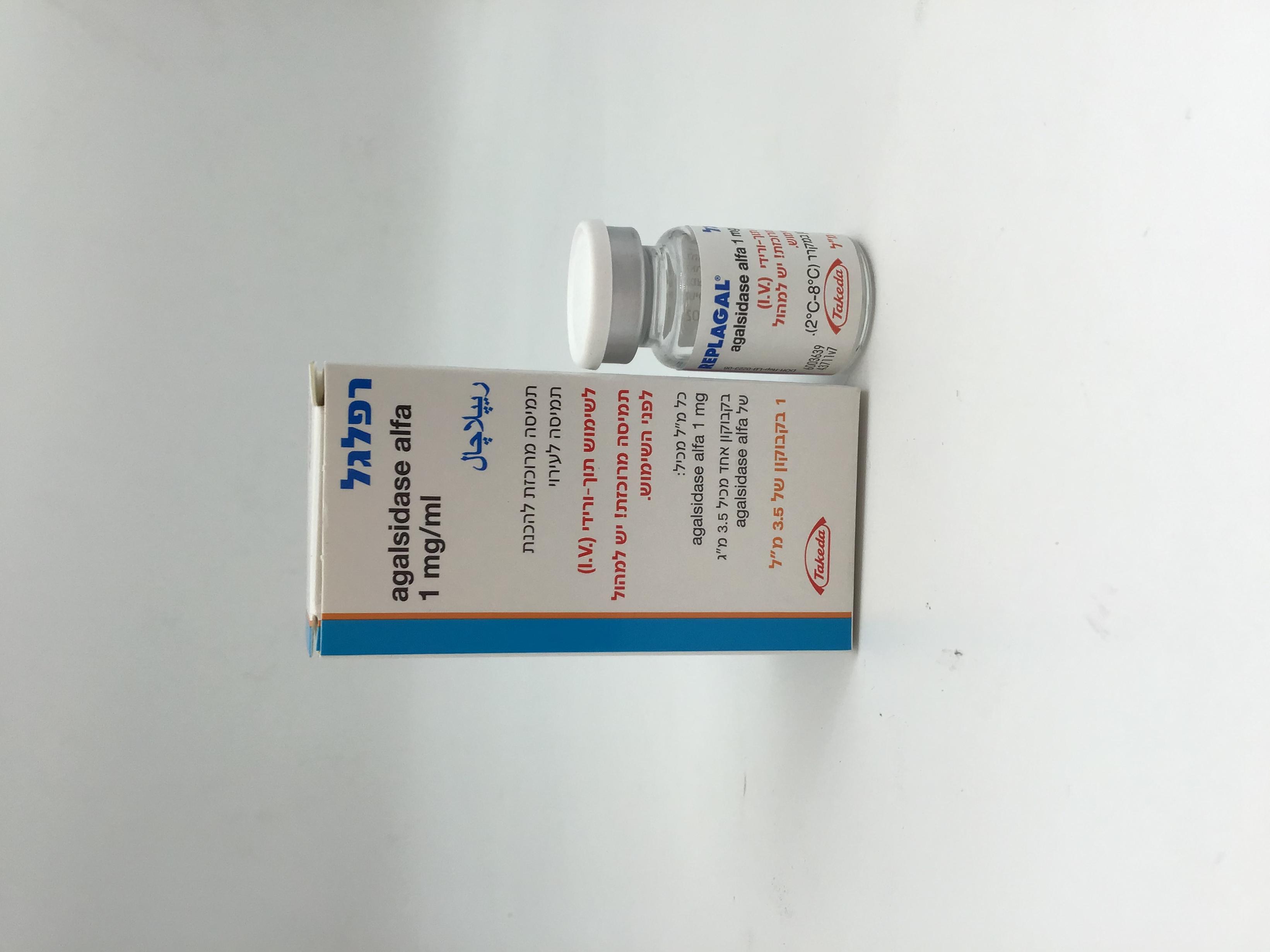Quest for the right Drug

רפלגל REPLAGAL (AGALSIDASE ALFA)
תרופה במרשם
תרופה בסל
נרקוטיקה
ציטוטוקסיקה
צורת מתן:
תוך-ורידי : I.V
צורת מינון:
תרכיז להכנת תמיסה לאינפוזיה : CONCENTRATE FOR SOLUTION FOR INFUSION
עלון לרופא
מינוניםPosology התוויות
Indications תופעות לוואי
Adverse reactions התוויות נגד
Contraindications אינטראקציות
Interactions מינון יתר
Overdose הריון/הנקה
Pregnancy & Lactation אוכלוסיות מיוחדות
Special populations תכונות פרמקולוגיות
Pharmacological properties מידע רוקחי
Pharmaceutical particulars אזהרת שימוש
Special Warning עלון לרופא
Physicians Leaflet
Special Warning : אזהרת שימוש
4.4 Special warnings and precautions for use Traceability In order to improve the traceability of biological medicinal products, the name and batch number of the administered product should be clearly recorded. Idiosyncratic infusion related reactions 13.7% of adult patients treated with Replagal in clinical trials have experienced idiosyncratic infusion related reactions. Four of 17 (23.5%) paediatric patients ≥7 years of age enrolled in clinical trials experienced at least one infusion reaction over a period of 4.5 years of treatment (mean duration of approx. 4 years). Three of 8 (37.5%) paediatric patients <7 years of age experienced at least one infusion related reaction over a mean observation time of 4.2 years. The most common symptoms have been rigors, headache, nausea, pyrexia, flushing and fatigue. Serious infusion reactions have been reported uncommonly; symptoms reported include pyrexia, rigors, tachycardia, urticaria, nausea/vomiting, angioneurotic oedema with throat tightness, stridor and swollen tongue. Other infusion-related symptoms may include dizziness and hyperhidrosis. A review of cardiac events showed that infusion reactions may be associated with hemodynamic stress triggering cardiac events in patients with pre-existing cardiac manifestations of Fabry disease. The onset of infusion related reactions has generally occurred within the first 2-4 months after initiation of treatment with Replagal although later onset (after 1 year) has been reported as well. These effects have decreased with time. If mild or moderate acute infusion reactions occur, medical attention must be sought immediately and appropriate actions instituted. The infusion can be temporarily interrupted (5 to 10 minutes) until symptoms subside and the infusion may then be restarted. Mild and transient effects may not require medical treatment or discontinuation of the infusion. In addition, oral or intravenous pre-treatment with antihistamines and/or corticosteroids, from 1 to 24 hours prior to infusion may prevent subsequent reactions in those cases where symptomatic treatment was required. Hypersensitivity reactions Hypersensitivity reactions have been reported. If severe hypersensitivity or anaphylactic reactions occur, the administration of Replagal should be discontinued immediately and appropriate treatment initiated. The current medical standards for emergency treatment are to be observed. Antibodies to the protein As with all protein pharmaceutical products, patients may develop antibodies to the protein. A low titre IgG antibody response has been observed in approximately 24% of the male patients treated with Replagal. Based on limited data this percentage has been found to be lower (7%) in the male paediatric population. These IgG antibodies appeared to develop following approximately 3-12 months of treatment. After 12 to 54 months of therapy, 17% of Replagal treated patients were still antibody positive whereas 7% showed evidence for the development of immunologic tolerance, based on the disappearance of IgG antibodies over time. The remaining 76% were antibody negative throughout. In paediatric patients >7 years of age, 1/16 male patients tested positive for IgG anti- agalsidase alfa antibodies during the study. No increase in the incidence of adverse events was detected for this patient. In paediatric patients <7 years of age, 0/7 male patients tested positive for IgG anti-agalsidase alfa antibodies. IgE antibody positivity not associated with anaphylaxis has been reported in clinical trials in a very limited number of patients. Patients with renal impairment The presence of extensive renal damage may limit the renal response to enzyme replacement therapy, possibly due to underlying irreversible pathological changes. In such cases, the loss of renal function remains within the expected range of the natural progression of disease. Sodium This medicinal product contains 14.2 mg sodium per vial, equivalent to 0.7 % of the WHO recommended maximum daily intake of 2 g sodium for an adult.
Effects on Driving
4.7 Effects on ability to drive and use machines Replagal has no or negligible influence on the ability to drive and use machines.

מסגרת הכללה בסל
התוויות הכלולות במסגרת הסל
| התוויה | תאריך הכללה | תחום קליני | Class Effect | מצב מחלה |
|---|---|---|---|---|
| AGALSIDASE ALFA | ||||
| AGALSIDASE BETA |
שימוש לפי פנקס קופ''ח כללית 1994
לא צוין
תאריך הכללה מקורי בסל
01/03/2002
הגבלות
תרופה מוגבלת לרישום ע'י רופא מומחה או הגבלה אחרת
מידע נוסף
